SEO Made Simple: Where & How to Use Keywords in Your Content

Table Of Contents
- What Are Keywords?
- Keywords and SEO
- Can Keywords Change Blog Strategy?
- 4 Types Of Keywords
- Benefits Of Keyword Research
- How To Effectively Use Keywords
- 3 Keyword Practices To Avoid
- Key Takeaways
- Conclusion
- FAQs
Blogging has been part of the world wide web for quite some time now. However, it looks a lot different now than when it first started. Earlier, people read the blogs they followed or subscribed to. Today, however, the traffic that blogs get is not only determined by your followers or subscribers. Keyword research for blog posts are essential to make it rank on search engines. Search engines have taken over the blogosphere. A majority of traffic to your blog can come from search engines. But, to get that traffic, you need to understand how to use keywords in content writing.
In this article, you will learn everything about keyword research for blog posts and how to use keywords for blog posts effectively.
Let’s start with a beginner’s guide to using keywords for blog posts.
What Are Keywords?

Keywords are phrases or words users type into a search engine to search for some sort of information. That information could be anything as basic as checking the weather, looking up a certain movie, finding a store, and so on.
For a blogger, using keywords in content writing simply means that these keywords that your blog visitors may potentially use must be included in your articles. People looking for your products and services will come across your blog posts due to those keywords for blog posts. The keywords in your blog posts would make your blogs visible and give your audience the answers they are searching for.
Keywords and SEO
Conducting keyword research for blog posts can help you to:
- Write relevant and useful content for the target audience
- Identify and speak the language of the target market
- Display the right content at the right time to the right people
- Communicate to Google that a page on the site is a relevant match for a certain query
- Recognize and speak the language of the target market
- Augment time on the site by driving more qualified traffic to a webpage
- Improve conversions by reaching out to consumers before your competitors
All these are crucial when it comes to SEO. Keyword research for blog posts help you to understand your target customers.
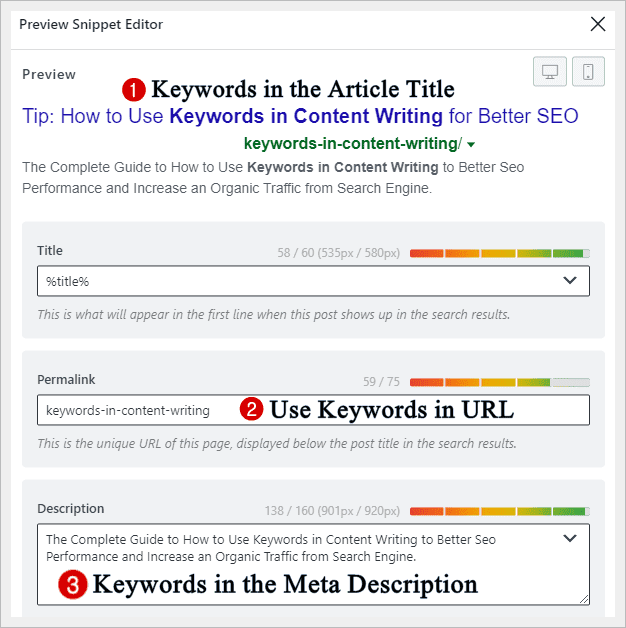
Can Keywords Change Blog Strategy?
Blog posts based on keyword research are different because they primarily focus on answering a question posed by the users. A blog post related to personal experience or a post related to a new idea that doesn’t answer any existing question is unlikely to get much traffic from Google or other search engines. This is because people are not searching for them.
But does this imply that you can just write blogs on these existing questions? Well, not all. A topic without enough search demand might still receive engagement traffic from other channels like Twitter or Facebook. This is why conducting keyword research for blog posts becomes crucial.
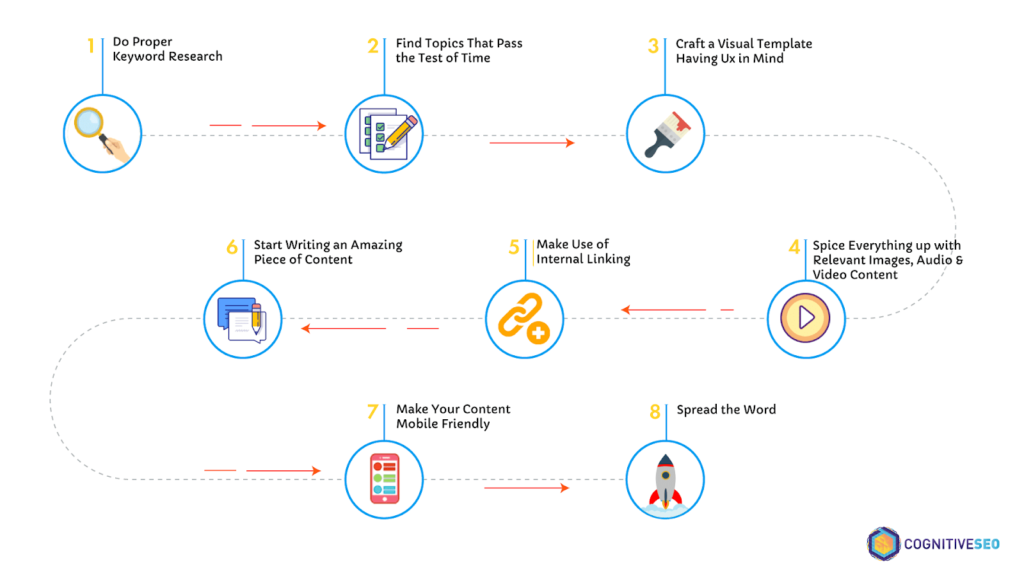
4 Types Of Keywords

Whether you are new to digital marketing or have your own business, it is important to know about the different kinds of keywords you can use in content writing.
1. Informational
You will find plenty of keywords with considerable search volume, which will not bring enough conversions. This is because people are just searching for information. The keywords used in this are known as informational keywords.
A few examples of informational keywords are,
- ‘When is international coffee day’ or just ‘international coffee day’
- ‘How many calories does coffee have?’ or just ‘coffee calories’
It is possible to differentiate this kind of keyword by ‘question words’ since they generally contain words such as is ‘how,’ ‘what is,’ and more.
Usually, these keywords have less intent when it comes to taking real action than commercial or transactional keywords. But, if these keywords are used effectively, they can be valuable in developing brand awareness as you can target them for informational content that will provide your audience with some knowledge.
2. Navigational
If someone types in the name of a brand or company into the search engine, they are actually doing a navigational search.
A few examples of these keywords are,
- Pepper content blog
- YouTube
People using this keyword are already aware of the product or the company. They are just looking for the right physical location or site to secure their products.
Navigational keywords can be helpful organic traffic sources. Keyword research for blog posts would tell you the format with which people are searching.
3. Transactional
These keywords have the most robust intent to purchase or take immediate action. Transactional keywords are usually targeted with paid ads. They can be used for optimized purchase pages where customers take immediate action.
A few examples of transactional keywords are,
- A pickup truck for sale
- Buy crypto
The searches might happen when someone has previously searched for the item they want and is ready to decide and complete the purchase. Transactional keywords are also called buyer keywords. These keywords are usually used in content writing to target the individuals at the bottom of the sales funnel.
4. Commercial
Commercial keywords reveal the users’ interest in certain products or services. The search will occur when someone wants to find out more about a specific product or service. They might be looking for details before purchasing and comparing it to similar products.
Some commercial keywords are,
- iPad Air vs. iPad
- iPhone reviews
Since the keywords show a person’s intention to purchase or take action, they are great opportunities to reach out to the target audience. These keywords for blog posts, when used effectively, might even help with customer conversion.
Benefits of Keyword Research
You might have already heard people say that keywords are crucial for SEO. In this section, we will highlight the top reasons to conduct keyword research for blog posts.

1. Gives you direction
One of the primary parts of your strategy is to plan, particularly when you are running a business. Keyword research will ensure better focus and direction.
When writing on a specific topic, you might know what you should write about to sell your product or service. However, if you do keyword research for blog posts, you can discover things people might be interested in. Thus, you can find the best topics in the category and write accordingly.
2. Enables you to use time efficiently
Sure, researching SEO keywords for blog posts can be time-consuming. However, the best thing about this is when you finish the keyword research, you will have an idea about precisely what you need to do.
An excellent strategy to follow while doing keyword research is to mark out the possible articles. As soon as you are done, you can have a plan. This will help save a lot of time as it is much better than performing a keyword search every time you come up with a new idea.
3. Helps you find new topics
When you have a specific topic in mind, performing keyword research for blog posts will help you expand on that. Various tools will give you an idea of what to write and how to sell. As you perform an SEO keyword search, it will keep the ideas flowing.

4. Takes care of competition analysis
One of the main goals of a website or a business is to achieve success. But, we live in a competitive world. So, keyword research for blog posts will help you figure out how to stand out from the crowd. It will also help you know how authoritative the other sites listed for the specific keyword are.
For instance, if you are a business focusing on health – an extremely competitive industry – you must be very specific. The best thing to do is to choose a niche you specialize in. A niche might be something like ‘acne creams.’ Performing a competitor analysis will show you how many businesses in your sector are using ‘acne creams’ as a keyword and how they are performing as a result.
5. Offers the best listings in the search engine
Google is the most advanced search engine for effective keyword research. So, if you search for keywords for blog posts keeping Google in mind, you can get the maximum exposure. Other search engines are Bing and Yahoo. Generally, these follow suit when you have optimized the site for Google.

If you research keywords for blog posts correctly, you will find competitive keywords for the one you are searching for. Go for keywords with the lowest competition. This will help create a more focused strategy.
6. Helps in targeting the right target audience
When you create a website or business, you have to target the right audience to be successful. For instance, assume you have a website on skincare. Writing healthcare articles is not going to help. Skincare may be part of healthcare, but the latter is too broad a topic.
Effective keyword research for blog posts will help you focus on the right audience.
How to Effectively Use Keywords
Using keywords in content writing is a crucial part of efficient Search Engine Optimization (SEO). After all, search engines require some kind of written content to assess what the article is about and if it is relevant to the user’s queries.
But, to stand out from others, the keywords you are using must be strong and used wisely in the article. Do not try to stuff keywords without focusing on the quality of your article. It has no positive effect whatsoever on your end goal.
Here we list some of the best practices of using keywords in content writing.
1. Conduct keyword research
Before looking for ways to use keywords in your content, perform keyword research for blog posts compatible with search engine optimization (SEO). If you find the right keyword, you can improve your visibility and ranking on the search engine result pages (SERP). This is an essential aspect of SEO. Several online tools help in keyword research.
People have a misconception that just one round of keyword research is enough. Keyword research for blog posts is a never-ending process that must be done now and then. With time, keywords grow and have to be replaced. To make effective use of keyword research in content writing, one must tailor them according to popular searches.
Here are some things you need to consider when developing your keyword list.
- Keywords having less than 4 characters might give false results
- Assess your competitors’ keywords
- Avoid noise words such as on, is, etc., since many software do not recognize them.
2. Map the keywords
Several websites use keyword mapping. When you have a list of keywords relevant to your content, map out where each keyword needs to be placed on every page of the site.
The basic idea behind keyword mapping is to keep you from loading keywords on the front page. It will also help avoid identical keywords on every page. It is crucial to know where to use the keyword based on the content on each page. To use keywords effectively, find out what makes every page stand out from the other and place the keywords in alignment.
You can analyze the related terms for every keyword or enter one into a Google search to determine what pages show up. Use each keyword on a page that contains similar content and is at the top of the SERP.
3. Include keywords in the page title
You should use the primary keyword at least once in the page’s title. This is because the title holds a lot of authority. A reader is more likely to notice the title on the SERP. So, it has to be relevant and genuine enough to compel the searcher to click on it. Moreover, search engines also assess and analyze the title before ranking it on the SERP since it tells the search engine what the content is about.
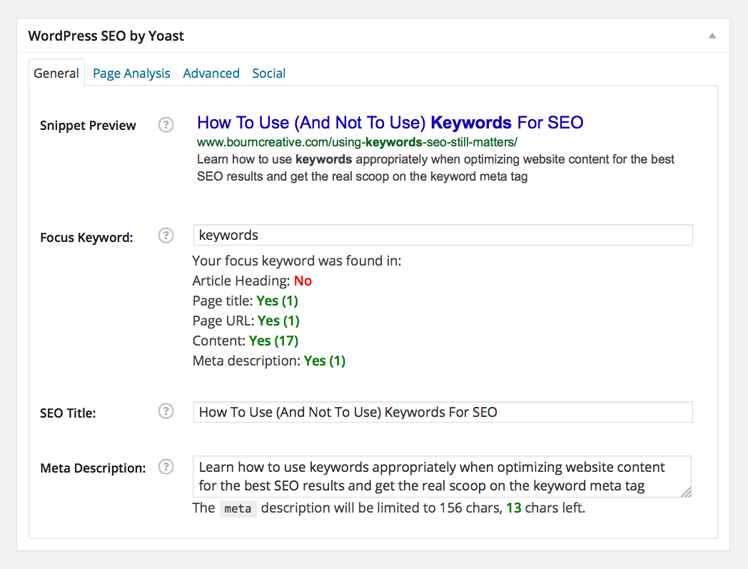
4. Place keywords in the URL
URL or Uniform Resource Location is the link or web address of a file on the Internet. Each file has a unique URL. So, the primary keywords need to be part of the article’s URL. This helps the search engine recognize it as relevant to the searcher’s query.
Moreover, phrases from the URLs might be used as anchor texts for several content-based articles present on the web. This is why it is crucial to have a keyword phrase in the URL. Conduct thorough keyword research for blog posts to find the most relevant phrases.
5. Use tag keywords on meta descriptions
Searchers and search engine crawlers get a preview of the article through meta descriptions. Although the meta description doesn’t appear in the actual content, it appears on the SERP when someone posts a query. You have to tweak its content to incorporate the keywords. The inclusion of keywords in the meta description will earn you more and more clicks.
6. Include keywords in the content
One of the most important aspects of keyword usage is including it in the main content. Ultimately, it is your content that the search engine will assess to determine its relevance to the user’s search queries.
A few things that you need to consider to use keywords effectively in content writing are as follows:
. Choose the right keyword
Make sure that you go for the right keyword density for your article. Keyword density is the number of times you should include a keyword in the article. The general keyword density criterion is 1%-4%. However, it varies from one piece to the other. All you have to do is ensure that you are not overusing the keyword. You can use the tools available to know the optimal keyword density.
. Choose relevant keywords
Use relevant keywords in your content. If the keyword you have chosen isn’t relevant, it will not matter if you are ranking higher in the search engine result pages. Users will exit the page as soon as they find it irrelevant, even without reading the whole content. The key to using keywords effectively in content writing is to find the most relevant keywords and space them naturally throughout the content.
. Placement is crucial – even more than frequency
Sure, including the right amount of keywords in an article can improve the visibility and ranking of the article in the SERP. Still, too many mentions might compromise the quality of your content. Hence, focus more on the keyword’s placement. We have already told you where to place the keywords – URL, title, meta description, and the actual content.
7. Insert the keywords in the article naturally
In this SEO-driven digital world, you might forget that readers are your priority. Don’t compromise on the readers’ ability to be engaged, enlightened, and engaged by the content you are creating due to bad keyword placement. This is more common than you think.
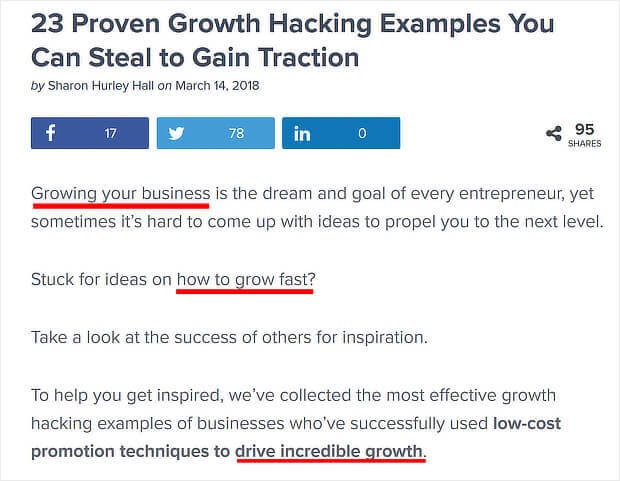
To avoid this, use stop words in any awkward keyword phrases. This is a great way to write keywords more naturally. For instance, when you have a target keyword phrase that reads ‘carpenter Orlando,’ there is no way to include it into the content just as it is without it appearing like a blatant keyword inclusion or a typo. So, if you add the stop word ‘in,’ the phrase will read ‘carpenter in Orlando.’ This will help in inserting the keyword naturally into the article.
8. Use keywords in the last 200 words
The introduction is an integral part of an article as it sets the framework. But, the conclusion is just as crucial. So, add the primary keyword near the second last, or last paragraph. Also, include the secondary keyword in this part of the article. Moreover, it is generally a good practice to have a call-to-action in the last paragraph in blog posts. You have to use keywords effectively and naturally throughout the article.
9. Insert keywords in the headings
Large chunks of paragraphs without any ending can often be intimidating for readers. Thus, they tend to skip it. Hence, headings are a crucial element. They help break up the text and are a must-have in improved readability of content. This helps readers easily find the content that they are most interested in. You can use keywords effectively in content writing by placing them on subheadings.
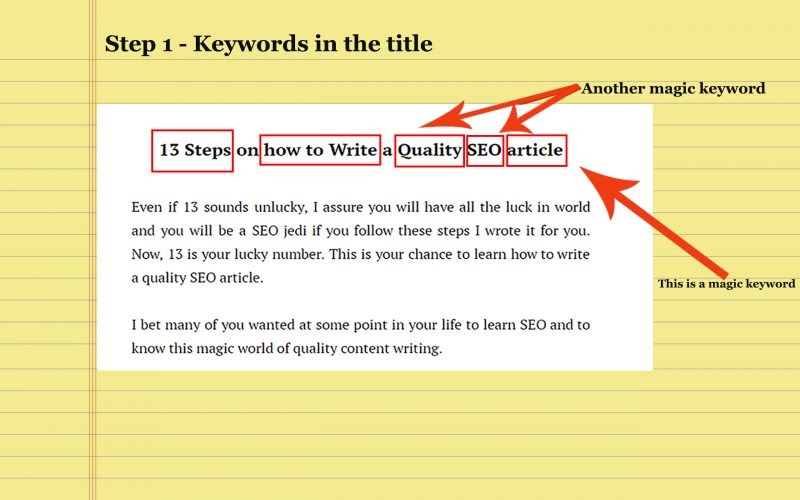
Headings are also important for SEO. The HTML tags used for identifying H1, H2, etc., are the ranking signals for the search engines to know what is more important in the article. Including keywords in headings might be one of the best ways to rank for multiple keywords.
10. Include keywords in the image alt-tags
If you are not using images in your content, please do. Without images, your content will miss out on a lot of opportunities. Content writing and images are an ideal match in terms of user engagement. Adding keywords in the image alt-tags will help it be displayed in the searches. It will lead the users to search for the keyword to your content. Moreover, images can break up the text and might provide it with some color and personality.
11. Don’t forget the target audience
When writing any content, you have to consider your target audience. They are the most important aspect of content marketing and SEO. You might have done everything you can to optimize a page to ensure it shows up in the top search results, just to discover that the user finds the terms used in the content to be irrelevant.
If you lose focus of your target audience, two things can happen.
- People who are not your target audience will open your content and realize that it isn’t what they wanted and leave quickly. They are probably going to avoid your site in the future.
- Your target audience might not ever come across your content in their search result.
So, make sure that you conduct thorough keyword research for blog posts, eliminate the keywords that will attract the wrong audience to the site, and space keywords naturally throughout the content. Look for search terms that your target audience is using.
3 Keyword Practices To Avoid
- Avoid using the same keywords as your competitors: Make sure that you don’t use the same keywords as your competitor. This will not allow your content to be extraordinary. Be more creative to make your content stand out.
- Avoid using just one keyword: Using just one keyword phrase can make the content appear repetitive. Some readers might also find it boring. You might also be penalized by search engines. Instead, focus on creating different keyword phrases. This will keep the content risk-free and interesting. We cannot emphasize the importance of conducting keyword research for blog posts.
- Avoid overstuffing keywords: Often, people think that stuffing as many keywords as possible can over-optimize the article. Take this as a fair warning – there’s nothing called over-optimization. In fact, if you load your content with keywords, it will compromise the keyword quality. Also, search engines don’t take keyword stuffing lightly.
Key Takeaways
- Keywords are an important aspect of ranking on search engines.
- Conducting detailed keyword research for blog posts is very crucial to choose the most relevant and most popular searches.
- Keyword research for blog posts also helps a brand to assess competitors and ideate blog topics.
- Use keywords effectively in the title, headers, sub-headers, URL, meta description, and alt-images.
- Avoid overstuffing keywords into blog posts.
- Insert the keywords as naturally as possible. Do not abruptly put keywords in random places.
Conclusion
Blogging is one of the most crucial aspects of content marketing in recent times. As algorithms are ever-changing, you must keep up with the recent trends and choose long-tailored, or short keywords effectively. As mentioned before, keyword research for blog posts would help you to assess competitors, choose the most relevant keywords, and focus the direction of your writing. Like all aspects of content marketing, keywords are crucial if you want to meet your end goal of driving quality, relevant traffic to your blogs or articles. Understand your target audience and follow the best practices mentioned above.

FAQs
The basic process is to select phrases or words aligning with the content. After that, you can conduct keyword research for blog posts using a search engine, platforms, and free online tools. SEO tools will provide you with additional keywords and the associated metric that will help in zeroing in on the keyword(s) that will work best for your content.
There is no precise answer to this question. You need to have a handful of target keywords and utilize them whenever you can. You can increase the density of the keywords on a page to include more keywords, but that is not a good idea as it can diminish the content’s quality.
Keywords will help with your page rank search, but if they are not used effectively, and the content is of poor quality, the keywords will not matter. The best way to use keywords effectively and avoid overstuffing is to place a few under each subheading.
You can include keywords in the titles, title tags, heads, subheads, image tags, alt text, and meta description. These are some effective ways to ensure that yoru content appears on search engines. You can also sprinkle keywords all across the body of your content. Include as many primary keywords as you naturally can at the top to rank higher.
The good keywords for blog posts are the ones that are authoritative, relevant, and are used often by searchers. So, you have to look for the highly searched keywords that can compete for the competition you are up against. Keywords research for blog posts would help you to understand your target audience and choose the most relevant phrases that are often looked up.
If you have to identify keywords, you will first have to learn about the question. Usually, it is much easier to have a topic than a research question. Your target audience would focus and narrow your search for keywords for blog posts. Sprinkle them naturally so that it does not interrupt the readability of your content.
Keywords for blog posts are important for SEO as it is the connection between what the audience is searching for and the content you are offering to cater to their need. So, keywords are as much about the audience as they are about the content as it describes the products and services you offer but in a different way. Thus, you should know how to use keywords for your content.
Latest Blogs
Explore how Google’s 2025 AI search updates triggered ranking chaos. Learn actionable strategies to adapt your SEO for AI Overviews, zero-click searches, and SERP volatility. Stay ahead now.
Learn how to rank on AI search engines like ChatGPT, Perplexity, and Gemini by optimizing your content for authority, structure, and relevance. Stay ahead in AI-driven search with this strategic guide.
Explore the best healthcare SEO services for your medical practice. Improve online visibility and effectively reach more patients in need of your services.
Get your hands on the latest news!
Similar Posts

B2C Marketing
5 mins read
Top Choices for Best Content Marketing Services in B2B Industries

Artificial Intelligence
5 mins read
How A Lead Generation Specialist Can Use AI-Powered Content Funnels to Drive Conversions

Artificial Intelligence
4 mins read